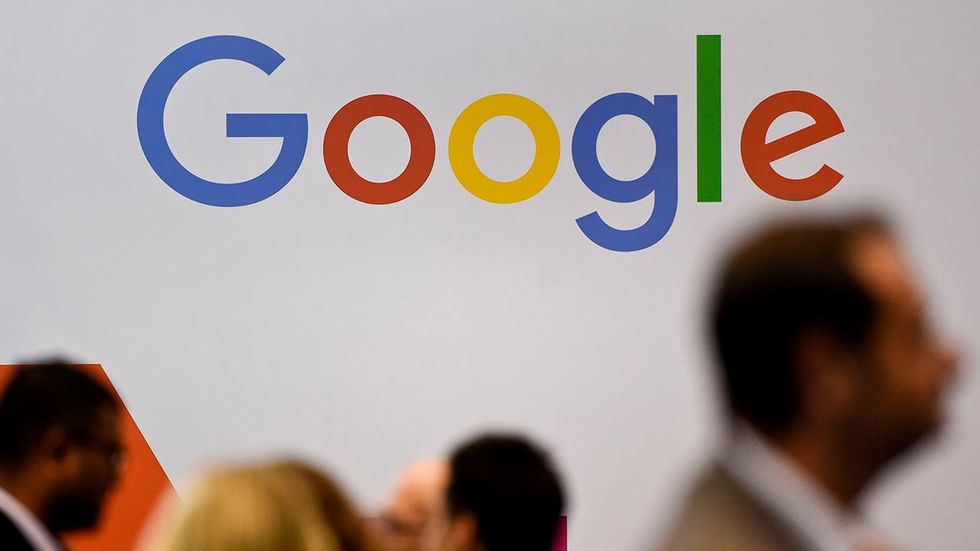
The Daily Caller reported that Google employees discussed whether search results from conservative media outlets should be buried following the election of President Donald Trump in 2016. (PATRICIA DE MELO MOREIRA/AFP/Getty Images)

Google employees discussed whether search results from conservative media outlets should be buried following the election of President Donald Trump in 2016. Their comments were revealed through internal Google documents obtained by The Daily Caller.
Documents show that the internet giant named The Daily Caller and Breitbart as potential targets to bury. In the documents, the websites were also called “opinion blogs.”
Google employees said they were upset about Hillary Clinton’s loss and they discussed how Google “could prevent Trump from winning again,” the Daily Caller reported.
Google engineer Scott Byer wrote on Nov. 9, 2016:
This was an election of false equivalencies, and Google, sadly, had a hand in it.How many times did you see the Election now card with items from opinion blogs (Breitbart, Daily Caller) elevated next to legitimate news organizations? That’s something that can and should be fixed.
I think we have a responsibility to expose the quality and truthfulness of sources – because not doing so hides real information under loud noises.
Beyond that, let’s concentrate on teaching critical thinking. A little bit of that would go a long way. Let’s make sure that we reverse things in four years – demographics will be on our side.
Google engineer Uri Dekel, who said he is a Clinton supporter, suggested that manipulating search results was the wrong tactic.
“Thinking that Breitbart, Drudge, etc. are not ‘legitimate news sources’ is contrary to the beliefs of a major portion of our user base is partially what got us to this mess. MSNBC is not more legit than Drudge just because Rachel Maddow may be more educated / less deplorable / closer to our views, than, say Sean Hannity,” Dekel wrote in response to Byer.
“I follow a lot of right wing folks on social networks you could tell something was brewing," Dekel continued. "We laughed off Drudge’s Instant Polls and all that stuff, but in the end, people go to those sources because they believe that the media doesn’t do its job. I’m a Hillary supporter and let’s admit it, the media avoided dealing with the hard questions and issues, which didn’t pay off. By ranking ‘legitimacy’ you’ll just introduce more conspiracy theories.”
In response to his original post, Byer wrote, “Too many times, Breitbart is just echoing a demonstrably made up story.”
He did not list examples.
“That happens at MSNBC, too,” he continued. “I don’t want a political judgement. The desire is to break the myth feedback loop, the false equivalency, instead of the current amplification of it.”
Google engineer, Mike Brauwerman, suggested an action the company could take while avoiding accusations of being biased:
What I believe we can do, technically, that avoids the accusations of conspiracy or bias from people who ultimately have a right and obligation to decide what they want to believe, is to get better at displaying the "ripples" and copy-pasta, to trace information to its source, to link to critiques of those sources, and let people decide what sources they believe.
“Give people a comprehensive but effectively summarized view of the information, not context-free rage-inducing sound-bytes,” Brauwerman added.
David Besbris, vice president of engineering at Google, wrote that the company is “working on providing users with context around stories so that they can know the bigger picture."
“We can play a role in providing the full story and educate them about all sides. This doesn’t have to be filtering and can be useful to everyone,” he wrote.
In 2017, Google introduced a short-lived fact-check feature that almost exclusively targeted conservative outlets and was riddled with errors, the Daily Caller said.
“Google’s fact check repeatedly attributed false claims to those outlets, even though they demonstrably never made those claims,” the outlet reported.
The fact-check feature was phased out in January.
A Google spokeswoman told the Daily Caller that the conversations never led to the manipulation of search results.
“This post shows that far from suppressing Breitbart and Daily Caller, we surfaced these sites regularly in our products. Furthermore, it shows that we value providing people with the full view on stories from a variety of sources,” the spokeswoman wrote in an email to the Daily Caller. “Google has never manipulated its search results or modified any of its products to promote a particular political ideology. Our processes and policies do not allow for any manipulation of search results to promote political ideologies.”